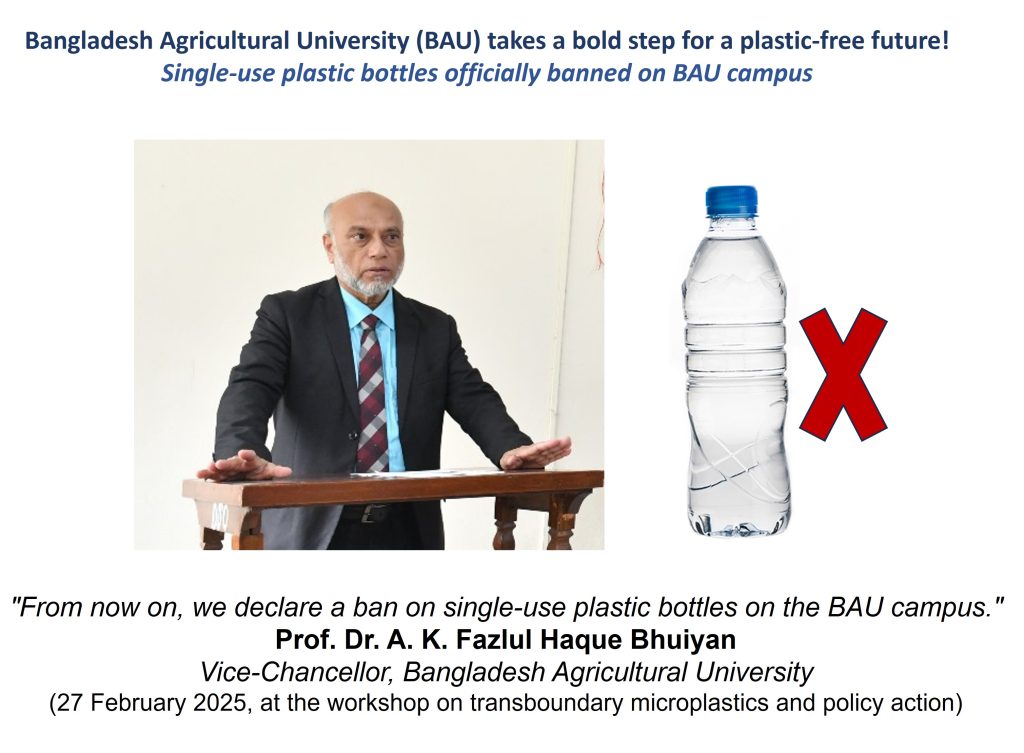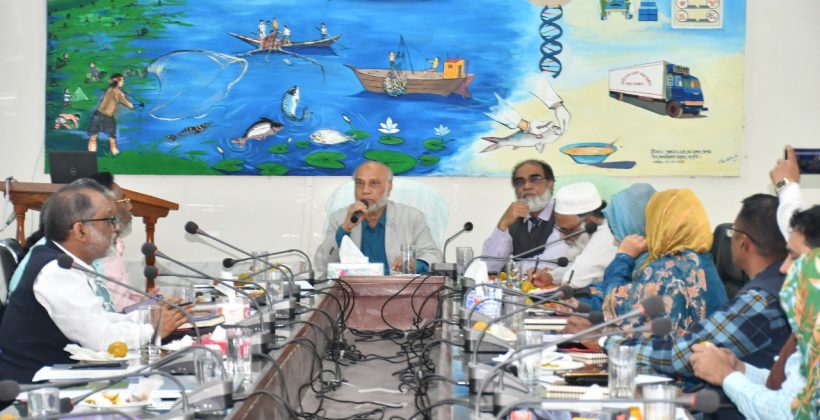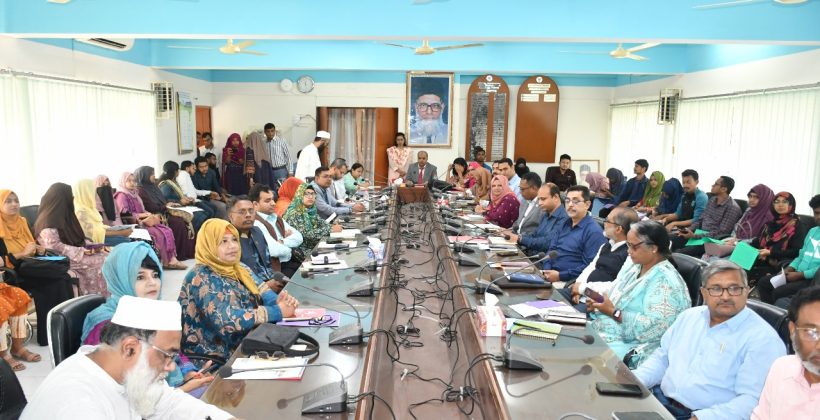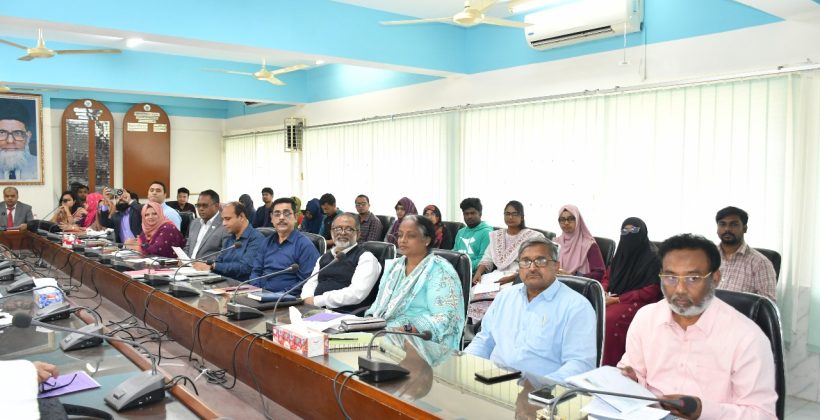27 February 2025, Mymensingh, Bangladesh – A policy recommendation and results dissemination workshop under the research project titled “Transboundary microplastics contaminations in fish and aquatic food chain along Brahmaputra River (CRRP2021-09MY-Rashid)”, funded by the Asia Pacific Network for Global Change Research (APN), was held at Bangladesh Agricultural University (BAU). The event, attended by 75 participants, was organised by the Department of Fisheries Management of BAU and moderated by the Project Team Leader – Prof Dr Harunur Rashid of the Department of Fisheries Management, BAU. The Honourable Vice-Chancellor of BAU, Prof Dr A. K. Fazlul Haque Bhuiyan, attended the workshop as the chief guest.
Prof Dr Md. Rafiqul Islam Sarder (Dean, Faculty of Fisheries, BAU), Chair of the workshop, opened the programme, and Dr Zoarder Faruque Ahmed (senior-most Professor of the Department of Fisheries Management, BAU) delivered the welcome address.
Prof Rashid, the team leader of the APN project, stated the background and objectives of the project, which aimed to assess transboundary microplastic pollution in the Brahmaputra River and its impact on fish, aquatic biota and the aquatic food chain. He highlighted that microplastic pollution in natural water bodies is a growing global concern, with the Brahmaputra-Jamuna River playing a significant role in this crisis. He also expressed the concern that South Asia ranks as one of the largest contributors to plastic pollution, with vast amounts of plastic waste flowing into the Bay of Bengal via the Ganges-Brahmaputra-Meghna River System.
Prof Dr Kizar Ahmed Sumon, Head of the Department of Fisheries Management at BAU and a project team member, presented the project’s key findings, which focused on the transboundary distribution of microplastics in water and sediment matrices. He outlined the sampling efforts carried out by the project team across three countries: Bhutan (Harachhu, Manas River and Toorsa River), India (Tuting, Dibrugarh, Tezpur, Guwahati and Dhubri) and Bangladesh (Kurigram, Sundarganj, Sariakandi, Sirajganj and Humuria). Assistant Professor Dutta at the College of Fisheries, Assam Agricultural University, briefly reflected on India’s research findings. Ms Yogeeta Dahal, Lecturer at the College of Natural Resources, Royal University of Bhutan, also shared a complementary summary of key observations from Bhutan’s study sites.
Dr Durin Akter Jahan (Chief Scientific Officer, Bangladesh Fisheries Research Institute), Mr Ripon Kumar Paul (Senior Assistant Director, Department of Fisheries, Mymensingh Division; under the Ministry of Fisheries and Livestock) and Ms Nazia Uddin (Assistant Director, Department of Environment, Mymensingh District; under the Ministry of Environment, Forest and Climate Change) represented three relevant government organisations and provided their policy recommendations based on the results shared. Dr Jahan expressed that research results should be shared among the law-enforcing agencies to ensure the effective implementation of environmental laws. Mr Paul encouraged regional and international collaboration and research on plastic pollution. He stressed that environmental policies and acts need to be adequately implemented, and programmes to motivate people are important to reduce the use of plastics. He further emphasised the need to monitor industries to ensure the proper establishment and operation of the Effluent Treatment Plan (ETP). Ms Uddin noted that enforcing environmental laws and practising 5R (refuse, reduce, reuse, recycle, recover) are key to reducing plastic pollution in the Brahmaputra-Jamuna River.
In addition to the above recommendations from three government organisations, many policy recommendations came from other workshop participants. Prof Dr Md. Samsul Alam (Coordinator, Committee for the Advanced Studies and Research, BAU) underscored the importance of practising 5R in everyday life and emphasised the importance of engaging city corporations in plastic waste management. Prof Dr Md. Ismail Hossain (Head, Department of Fisheries Technology, BAU) said municipalities must play a pivotal role in reducing plastic pollution in the rivers of concern. He also stressed the importance of mass media in improving public awareness. In his address as the chief guest, Prof Dr A. K. Fazlul Haque Bhuiyan (Vice Chancellor, BAU) highlighted that this project is a time-demanding research project for Bangladesh and the region. He noted that Bangladesh is most vulnerable to transboundary pollution as the most downstream of many transboundary rivers in this region. Nevertheless, he was optimistic about the formulation of effective policy recommendations during the workshop based on the findings of this project. At the end of his speech, the Vice Chancellor declared a ban on the use of plastic bottles inside the Bangladesh Agricultural University campus.

Prof Dr M. Hammadur Rahman (Director, BAU Research System) recommended that this transboundary collaboration be continued for policy formulation and recommendation. Prof Dr Mohammad Alam Miah (a microplastics researcher from the Department of Physiology, BAU) stated that national awareness should be raised to reduce the load of microplastics in our rivers. Prof Dr Md. Shahjahan (Department of Fisheries Management, BAU) underscored the need for a proper waste management system to reduce river plastic pollution. Prof Dr Md. Badiuzzaman Khan (Department of Environmental Science, BAU) recommended installing incineration plants to treat waste and banning single-use plastics. Prof Dr Md. Ali Reza Faruk (forthcoming Dean, Faculty of Fisheries, BAU) concluded the session by stressing the importance of transboundary and regional policy formulation and actions to reduce plastic pollution in shared rivers like the Brahmaputra-Jamuna.
The second session was divided into three groups, and the ‘Policy Canvass’ tool was used to define the key issues that will inform relevant policies addressing plastic pollution in the Brahmaputra-Jamuna River. The key issues identified during the policy canvass were: poor waste management in the Brahmaputra-Jamuna River regarding plastic pollution, lack of transboundary collaborations and regional actions regarding plastic pollution in the shared habitats and lack of public awareness.


